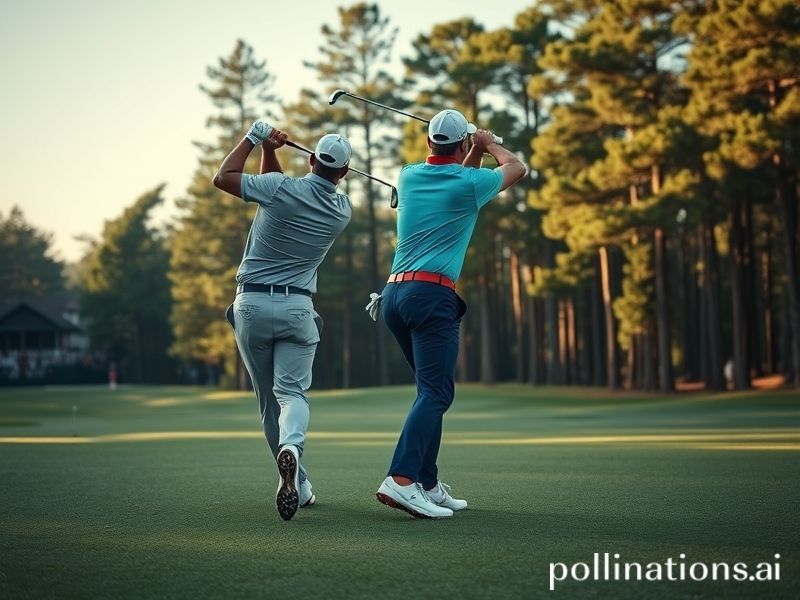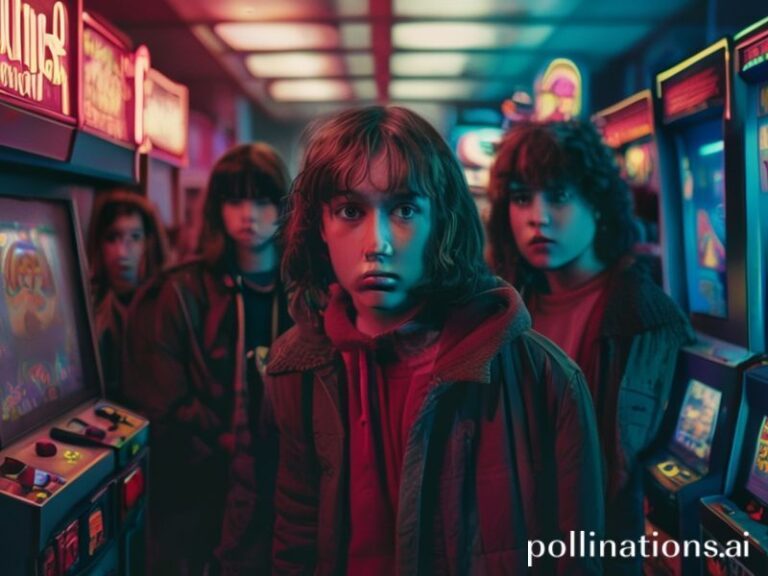Justin Rose vs. Bryson DeChambeau: A Global Rorschach Test in Golf Shoes
The Global Parable of Two Golfers, or How Justin Rose and Bryson DeChambeau Became a Geopolitical Rorschach Test
By our man in the 19th-hole press tent, still nursing yesterday’s painkillers and tomorrow’s regrets
PARIS — Somewhere between the Seine and the artificial intelligence expo that’s currently turning the City of Light into the City of Bluetooth, the planet’s attention pivoted this week to two men whacking a dimpled ball across a manicured meadow in Georgia. Justin Rose, the Englishman who looks like he irons his conscience every morning, and Bryson DeChambeau, the American who appears to have swallowed a physics textbook and a protein shake in the same gulp, are not merely contestants in the latest installment of “Who Gets the Shiniest Trophy.” No, they are unwitting ambassadors for two competing visions of late-capitalist civilization—one calibrated, the other calculated.
Let us zoom out, as any self-respecting international correspondent must. In Kuala Lumpur, traders tracking the ringgit’s mood swings paused their Bloomberg terminals to watch Rose line up a 12-footer, because the Malaysian rubber-glove index allegedly correlates with European Tour viewership. Meanwhile, in Lagos, where half the population is under 25 and the national grid flickers like a busted lava lamp, a WhatsApp group of hustlers placed micro-bets on whether DeChambeau’s biceps would register on the Richter scale. Somewhere in Davos, a junior partner at an ESG fund cited “the Rose-DeChambeau dichotomy” in a pitch deck about sustainable alpha. No one laughed; the client signed.
To the casual observer, the plot is simple: Rose, 43, represents the ancien régime—controlled tempo, modest fist pumps, a swing that politely apologizes to the turf. DeChambeau, 30, is the disruptor—single-length irons, launch-monitor monogamy, a physique forged in the same lab that gave us the F-35. But peel back the marketing veneer and you find a referendum on how the world now processes progress. Rose is Europe’s lingering belief that restraint can still be a competitive advantage; DeChambeau is America’s conviction that if brute efficiency can’t solve the problem, you simply need a bigger hammer. Both stances are charmingly delusional, which is why the rest of us can’t look away.
Consider the geopolitical subtext. The tournament is broadcast in 198 territories—one more than the number of United Nations member states, because golf now outranks diplomacy in global reach. Beijing’s censors allow the stream but delay it by ten minutes, presumably to scrub any footage of DeChambeau’s cap (emblazoned with a brokerage app that the PBOC regards as morally equivalent to fentanyl). In Moscow, state TV edits Rose’s post-round remarks to suggest he praised Russian agritech. Neither golfer is aware of this, but then again, neither was Julius Caesar aware he’d be rebranded as a salad.
The irony, of course, is that both men are prisoners of the same algorithm. Rose’s conservative strategy is reverse-engineered by ShotLink data; DeChambeau’s bulk is optimized by continuous glucose monitoring. They merely wear different costumes while dancing to the same spreadsheet. Which is why their duel resonates from Reykjavík to Riyadh: we all pretend we’re choosing between tradition and innovation, when mostly we’re choosing between two brands of surveillance capitalism that politely ask us to update our privacy settings.
And yet, for 72 holes, the illusion holds. Farmers in Uttar Pradesh debate whether Rose’s tempo is “meditative” or “geriatric.” Algorithmic traders in Singapore hedge yen exposure based on DeChambeau’s carry distances. Somewhere off the coast of Greece, a refugee rescue boat receives a crypto donation tagged “Rose birdie fund.” None of it makes sense, but coherence is so last season.
When the final putt drops, one man will lift a silver cup while the other practices his gracious loser face for the cameras. Stock indices may wobble, memecoins may moon, and cable-news chyrons will scream existential conclusions about “what it all means.” Spoiler: it means nothing and everything, like most things in 2024. The real winner is the broadcast conglomerate that sells both the anxiety and the antacid. The rest of us? We shuffle back to our respective time zones, slightly poorer in sleep, slightly richer in metaphors, and wholly convinced—against all evidence—that the next tiny white ball might finally explain why we keep paying attention.







